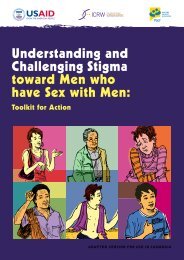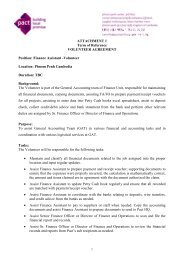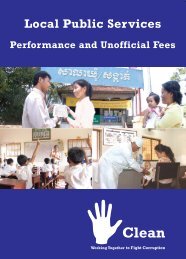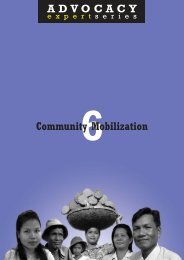Advocacy in Cambodia: Increasing Democratic ... - Pact Cambodia
Advocacy in Cambodia: Increasing Democratic ... - Pact Cambodia
Advocacy in Cambodia: Increasing Democratic ... - Pact Cambodia
You also want an ePaper? Increase the reach of your titles
YUMPU automatically turns print PDFs into web optimized ePapers that Google loves.
<strong>in</strong>put from AFL-CIO, the largest labor union <strong>in</strong><br />
the U.S., as well as the ILO. In general, the Labor<br />
Law is deemed to be sound, although gaps exist<br />
that need to be addressed through proclamations<br />
(Prakas).<br />
1999 Ratification of ILO Conventions<br />
In July 1999, <strong>Cambodia</strong> became the second<br />
country <strong>in</strong> Asia to ratify all seven core ILO<br />
conventions. Although ratification of the core<br />
conventions is not vital, all ILO members are<br />
deemed bound by them. The conventions provide<br />
leverage for foreign negotiators when they enter<br />
<strong>in</strong>to textile trade agreements, as has been used by<br />
the U.S. government.<br />
M<strong>in</strong>isterial Decrees<br />
In November 2001, the M<strong>in</strong>istry of Labor<br />
signed Proclamation (Prakas) #305 which clarified<br />
the barga<strong>in</strong><strong>in</strong>g process <strong>in</strong> response to a call by<br />
union federations and the U.S. Government to<br />
protect union leaders from arbitrary dismissal.<br />
One issue addressed was how to handle collective<br />
barga<strong>in</strong><strong>in</strong>g <strong>in</strong> cases where more than one union is<br />
represented with<strong>in</strong> a s<strong>in</strong>gle<br />
factory. In these cases, the<br />
collective barga<strong>in</strong><strong>in</strong>g<br />
agreement allows the largest<br />
union to represent the other<br />
unions.<br />
Proclamation #305 also<br />
regulates the use of<br />
demonstrations <strong>in</strong> order to<br />
ensure that strikers represent<br />
a majority of workers and that<br />
reasonable attempts have<br />
been made by both unions<br />
and employers to resolve<br />
disputes through negotiation.<br />
Separate proclamations and<br />
circulars have addressed<br />
issues such as provision of<br />
dr<strong>in</strong>k<strong>in</strong>g water and chairs to workers, sanitation<br />
conditions, and handl<strong>in</strong>g standards for workers<br />
who lift goods. Other issues addressed <strong>in</strong>clude the<br />
right of unions to check company f<strong>in</strong>ancial records<br />
and the possibility of unions collect<strong>in</strong>g dues<br />
through automatic deductions. To date, there has<br />
been no decree cover<strong>in</strong>g provisions for<br />
employment contracts (to respond to problems<br />
aris<strong>in</strong>g from the use of short-term contracts).<br />
Several federations are concerned about this issue<br />
and are call<strong>in</strong>g for proper legislation.<br />
Work<strong>in</strong>g Conditions and Labor Disputes<br />
The ma<strong>in</strong> problems encountered by garment<br />
workers <strong>in</strong>clude:<br />
• poor work<strong>in</strong>g conditions;<br />
The number of employerworker<br />
conflicts has steadily<br />
decreased each year s<strong>in</strong>ce<br />
1997, as employers accept<br />
the process of negotiat<strong>in</strong>g<br />
with unions, unions become<br />
stronger, and work<strong>in</strong>g<br />
conditions <strong>in</strong> factories<br />
improve.<br />
• health hazards that cause workers to<br />
contract diseases such as typhoid;<br />
• low or unequal distribution of wages;<br />
• long work<strong>in</strong>g hours;<br />
• lack of overtime pay;<br />
• forced overtime;<br />
• arbitrary dismissals, particularly of union<br />
leaders; and<br />
• sexual harassment.<br />
A number of these issues have been<br />
addressed <strong>in</strong> m<strong>in</strong>isterial decrees as described<br />
previously. In particular, the m<strong>in</strong>imum wage has<br />
been set at $45 per month with a bonus of $5 per<br />
month for regular attendance. M<strong>in</strong>imum wages<br />
have also been set for casual (part-time) workers<br />
and apprentices.<br />
The ILO’s First Synthesis Report on<br />
Work<strong>in</strong>g Conditions <strong>in</strong> <strong>Cambodia</strong>’s Garment<br />
Sector reviewed conditions <strong>in</strong> 30 factories<br />
employ<strong>in</strong>g 21,431 workers (of which 90% are<br />
women) dur<strong>in</strong>g the third quarter of 2001. The<br />
report <strong>in</strong>dicated that there was no evidence of<br />
child labor, forced labor, or sexual harassment <strong>in</strong><br />
participat<strong>in</strong>g factories. At the<br />
same time however, <strong>in</strong>correct<br />
payment of wages was<br />
frequent, overtime was often<br />
<strong>in</strong>voluntary, and freedom of<br />
association cont<strong>in</strong>ued to be<br />
<strong>in</strong>fr<strong>in</strong>ged upon <strong>in</strong> some<br />
factories. The ILO report also<br />
concluded that strikes were<br />
not always organized <strong>in</strong><br />
conformity with legal<br />
regulations.<br />
With respect to factory<br />
work<strong>in</strong>g conditions, <strong>in</strong> the<br />
future it is expected that the<br />
ILO factory monitor<strong>in</strong>g<br />
program will contribute to<br />
reduc<strong>in</strong>g problems <strong>in</strong><br />
participat<strong>in</strong>g factories. Currently 197 factories<br />
have voluntarily registered with the program,<br />
spurred by the <strong>in</strong>centive that only registered<br />
factories will be eligible to bid for U.S. import<br />
quotas.<br />
The number of employer-worker conflicts<br />
has steadily decreased each year s<strong>in</strong>ce 1997, as<br />
employers accept the process of negotiat<strong>in</strong>g with<br />
unions, unions become stronger, and work<strong>in</strong>g<br />
conditions <strong>in</strong> factories improve. However, one of<br />
the most difficult challenges to unions - arbitrary<br />
dismissal of union leaders - cont<strong>in</strong>ues to be a<br />
serious problem.<br />
Factory union leaders are usually elected and<br />
managers must get permission from the M<strong>in</strong>istry<br />
Case Studies<br />
61
















